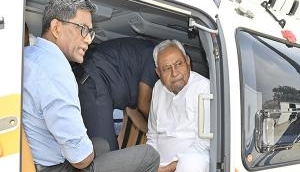The Surrogacy Debate: sorry folks, we are not renting our wombs any more

The Centre has an important announcement to make to the Supreme Court today. The announcement will clip the wings of a $ 2.3 billion unregulated fertility tourism. It will also mean that thousands of impoverished women will have to shut out what seemed to them like a viable earning option. Yet, after careful consideration, they're going to say it anyway:
India will no longer be the surrogacy capital of the world.
After a high-level meeting held earlier in the week, the Modi government has reportedly instructed solicitor general Ranjit Kumar to inform the Supreme Court that it will soon ban commercial surrogacy and not permit foreign couples to have children through surrogate mothers in India. This would mean turning down over a third of the demand. Surrogacy, however, will still be available as an option to childless Indian couples.
Fertility Tourism
Fertility tourism is the name given to boast India's booming $ 2.3 billion surrogacy industry that makes "renting a womb" possible for parents who cannot conceive children. Until now.
Once a woman agrees to become a surrogate mother, the egg is fertilised through In Vitro Fertilisation (IVF) and then placed inside the surrogate mother. This is known as gestational surrogacy and is one of the most common ways in which artificial reproductive technology (ART) is used. In the traditional surrogacy the surrogate mother would be artificially inseminated and would be the genetic mother of the child. While the former is legal, the latter is not.
India is one of the few countries in the world where commercial surrogacy is legal - where a surrogate mother gets paid to bear another couple's child and can do it to earn a living.
India has a $ 2.3 billion surrogacy industry that allows couples to 'rent a womb'
While the ethical aspects of surrogacy have been highly contentious abroad, with several countries totally banning it, it has remained largely unregulated in India. Until now.
A new draft bill pending in the parliament titled the Assisted reproductive technologies (ART) regulation bill, 2012, aims to change all that. The bill, expected to be passed in next month's winter session of parliament aims to bring in much tighter regulations, which many claim will clip the wings of the industry closing doors for non Indians to come "make in India" a baby.
Why does surrogacy in India need to regulated?
Over 3000 clinics in India providing IVF to surrogate mothers has turned India into the surrogacy capital of the world. Leading ART clinics oversee 100 to 300 births every year. The number of IVF cycles shot up from an estimated 7,000 cycles in 2001 to 85,000 in 2011.
A third of these births is estimated to be for foreign intended parents.
A 2013 report estimates that 25,000 foreign couples visit India for surrogacy services. That number is expected to have risen significantly in the last two years.
Having a surrogate baby costs anywhere from $18,000 to $30,000 of which hardly $ 5000 to 7000 is paid to the mother carrying the child. The rest of the money goes into paying middlemen, the clinic and the medical facilities involved in facilitating the process. Yet this is roughly a third of what it will cost in parts of the United States. For infertile foreigners and non-resident Indians (NRIs), ART in India is a relatively inexpensive proposition.
India itself has an estimated 20-25 million infertile couples. For medical practitioners this is a massive untapped opportunity.
India has no existing laws on commercial surrogacy - just loose guidelines issued by the Indian Council of Medical Research, which experts call toothless.
Researchers have often found that surrogate mothers are underpaid, not given proper knowledge of the contractual agreement and are left to fend for themselves once impregnated, left to be exploited by middlemen and intended parents.
A 2013 study conducted by the nonprofit Centre for Social Research found that 88 percent of surrogate mothers interviewed in Delhi and 76 percent in Mumbai did not know the terms of their contract. In fact, 92 percent of those in Delhi did not even have a copy of it.
The risks that surrogate mothers and vulnerable babies face, makes India an exploitative setup for surrogacy
One of the most pressing needs to regulate the sector is not just the conditions under which surrogate women give birth but the lack of any means to assure that the parents won't change their mind too late. The two big reasons for changing their mind has been because the intened parents have themselves separated or importantly, because the child didn't turn out to be of the sex they had wanted.
Take the case of Baby Manji for instance. In 2008, a Japanese couple who had arranged for an Indian surrogate to carry their baby got divorced while the child was still in the womb. Though the father wanted custody of the baby, Indian law doesn't permit single men to adopt, so Baby Manji remained in a Jaipur hospital for two years until custody was resolved. Last October, an Australian couple abandoned one of their twin babies born to a surrogate in Delhi because they already had a child of the same sex. In 2010 a French gay man, who had twins through an Indian surrogate, was allowed to travel back to France, where surrogacy is illegal. He is still engaged in a court battle with the government that took away the twins and placed them in foster care.
India is still fighting an uphill banning sex selection and abolishing female foeticide. India's unregulated surrogacy laws only show a gateway still open to select the gender of your child. In medical terms the practice is called Foetal reduction. While a woman can at the most accomodate two embryos inside her uterus, it is common practice for ART clinics to illegally inject three embroys and later remove the ones with the gender the parents don't want at a later stage imposing great risks to the health of the surrogate mother.
"In this business, the baby is the product. The surrogate is the means of production," said Ranjana Kumari of the Centre for Social Research to the media.
There have also been transnational issues getting citizenship to an Indian born surrogate child in a country where it is illegal, making it a messy complicated affair to take the baby back home as was apparent in the case of the French man.
The present risks faced both by the surrogate mothers and the vulnerable babies make India an exploitative setup for surrogacy, desperate for legislative protection.
What does the present draft bill aim to do?
Today's announcement to the Centre can be traced back to the draft ART regulation bill pending since 2012. It aims to regulate the sector by registering ART banks across the country. This should help monitor the safety and quality of treatment given at the clinics. Intending parents will have to go to these registered banks to identify surrogates as opposed to a shady route of unknown middlemen or private IVF clinics as is currently the case.
The Bill also seeks to streamline the process of recruiting surrogates, who currently earn anywhere between Rs.1.5 lakh to Rs.4 lakh for their services-with a 25% "bonus" for delivering twins.
The most significant change in the Bill however, is that it permanently shuts the doors for foreigners, NRI's and Persons of Indian Origin who reside abroad to come and have a surrogate baby in India.
While the draft bill already barred foreigners, Home ministry officials following a consultation with the National Commission for Women (NCW) confirmed that they would bar NRIs and PIOs in the version that would be tabled in Parliament.
"We do not want to be the commercial hub for surrogacy in the world," said Lalitha Kumaramangalam, the chief of NCW during the consultation at Vigyan Bhawan on 15 October.
"Surrogacy is increasingly becoming a contract between the haves and the have-nots," she said spelling that rise in unregulated surrogacy in India is also becoming one of the factors for increased trafficking.
"There are also multiple complex questions regarding citizenship of children, like in the case of the Israeli couple in 2010, or the case of the Australian couple, who took the child who was 'normal' but left behind the differently-abled child."
India has no existing laws on commercial surrogacy - just loose guidelines.
The draft bill also states that only a couple married for a minimum of two years will be allowed to opt for a surrogate baby. It prohibits intending parents who are in a same sex marriage, live in relationship or single parents to opt for surrogacy.
The NCW however stated that it is keen to broaden the definition of those eligible to be a surrogate mother to ensure that not just married women, but single, unmarried and divorced women too be allowed.
Is it enough?
AIPWA Secretary Kavita Krishnan called commercial surrogacy in India a "transnational mess" in which women's bodies were being plundered, rented and their impoverishment exploited with promises of adequate compensation. "What is consent if it comes out of extreme impoverishment?" she asked.
"First you say the woman who gives birth is the mother. Now you say 'oh! that's just the renting place. The real mother is the one who has genetically given her egg.' But in cases where a woman sells her egg, you say that she's not the real mother, the real mother is the one who bought it to conceive the child. Basically you're saying that if you have the money, a child can be bought any which way how," she says.
Many, like Krishnan are of the view that commercial surrogacy should be banned like it is across half the globe because the ethics involved make it impossible to regulate.
Perhaps India should consider the wisdom in what countries like UK, Ireland, Denmark and Belgium are doing by allowing only "altruistic surrogacy" where the surrogate mother is not paid a commercial fee but only paid for her medical expenses. Commercial surrogacy in these countries are banned because it violates human ethics.
While the Indian ART draft bill has plenty of gray, today's announcement helps us pause and invite a healthy debate which is imperative to the framing of any law.






![BJP's Kapil Mishra recreates Shankar Mahadevan’s ‘Breathless’ song to highlight Delhi pollution [WATCH] BJP's Kapil Mishra recreates Shankar Mahadevan’s ‘Breathless’ song to highlight Delhi pollution [WATCH]](https://images.catchnews.com/upload/2022/11/03/kapil-mishra_240884_300x172.png)

![Anupam Kher shares pictures of his toned body on 67th birthday [MUST SEE] Anupam Kher shares pictures of his toned body on 67th birthday [MUST SEE]](https://images.catchnews.com/upload/2022/03/07/Anupam_kher_231145_300x172.jpg)






